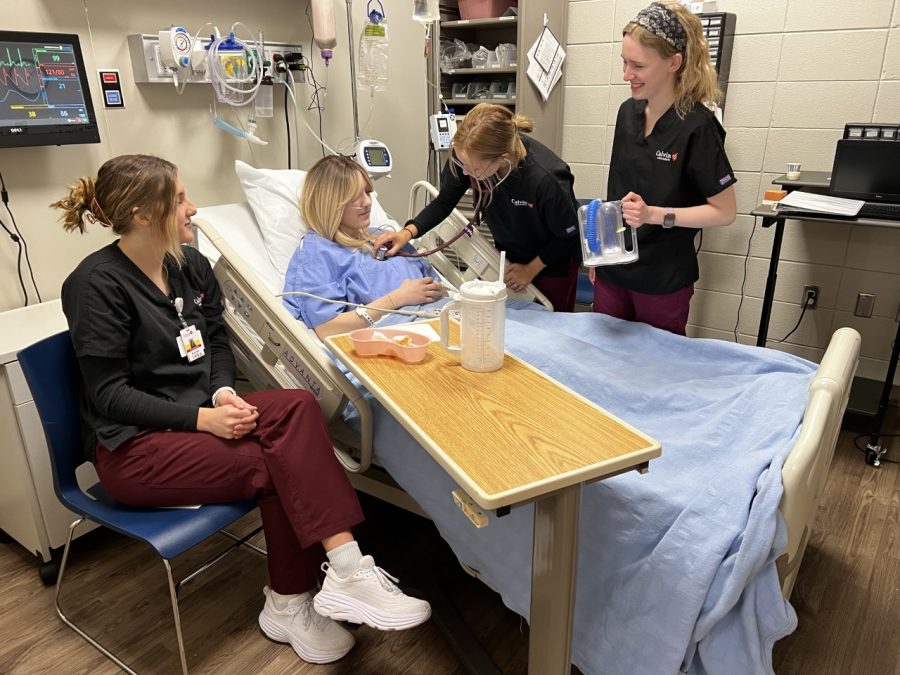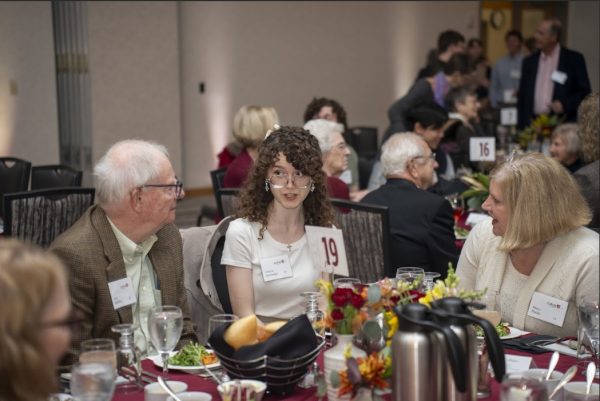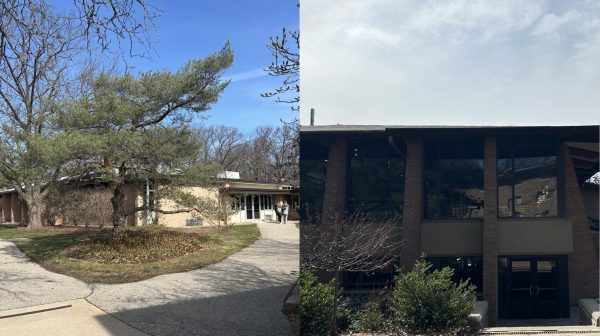University uses standardized patients to improve education
Photo courtesy Shelia Vander Wal
Three Calvin nursing students perform a simulation with assistance from Joy Adema, a standardized patient actor.
Do nursing and theater go together? The Standardized Patient Program (SPP) in the School of Health says“yes.” Thanks to a generous donation to Calvin’s nursing program, the department has been able to hire actors to participate in simulations in which nursing students train for real-life situations.
SPP is a widely used program that uses actors to play the parts of patients to give medical students practice before going into the field. This program is led by nursing professor Katherine Kunnen and Lab and Media Coordinator Sheila Vander Wal. Actors are used to simulate patients facing respiratory problems, alcoholism, epilepsy and other medical crises the students could encounter in their professional careers. Having someone in the room portraying a patient gives nursing students an opportunity to practice caring for a whole person.
“They do a lot of care for the whole person. So they are doing head-to-toe assessments of lung sounds and heart tones but they are also caring for the family member, caring for the mental health, and digging into things even like spiritual care. ” Vander Wal said. Students in Calvin’s nursing program spend 20% of their clinicals in SPP and the other 80% working in the field with real patients.
SPP gives students a safe space to make mistakes and learn from them, according to Vander Wal. “They just have so many opportunities to strengthen that muscle of being prepared for all types of situations that they are going to run into eventually,” Vander Wal said. Students work through a variety of simulations, including caring for hypertensive patients and handling symptoms like chest pain and hemorrhage. “They have this opportunity to practice all of these things in a safe environment and then can go out to the hospitals [for real-world clinicals] with a lot more confidence,” Vander Wal said.
Students are able to take their experience in the simulations and apply them in the field. “One of our students had a pediatric patient that had a seizure and she said ‘I knew what to do, we practiced it in sim.’ And she turned the patient onto their side and [had] the precautions ready in her head,” Vander Wal told Chimes.
Before the nursing program received the donation, the School of Health partnered with Calvin Theater Company to play the roles of the patients. Theater students are currently continuing to work in select simulations, but hired actors also play some roles throughout the semester. “The partnership is really cool between the theater students. I hope to have more bridges throughout the different disciplines so that the theater students can be exposed to medical acting,” Vander Wal said .
Joy Adema has worked as a standardized patient since Oct 2022 and will continue to work for Calvin Nursing for the rest of the spring 2023. Adema had experience performing in theater throughout high school. Adema plays a wide variety of roles throughout the semester.
“She knows a lot about makeup and putting on wigs and voicing. She has experience. We wouldn’t hire just anybody without the experience,” Vander Wal told Chimes. Actors come in with a range of skills and can be put into various levels of simulations depending on their experience. “It’s really fun because they are getting the opportunity to learn a little bit more about healthcare and discover more about nursing,” Vander Wal said.
Adema is a part of the debriefing that all of the students attend after a simulation. She provides feedback on her experience as a patient. “I usually just share how I’m feeling. If it was a comfortable environment, if they seemed like they had a lot of confidence, which is important, and a lot of the time patients don’t understand the medical language they used so another thing I tell [them] is if they were clearly communicating with me in simpler terms,” Adema said.
The nursing students go through the same procedures that they would use throughout in-patient clinicals. The simulation scenarios are based on briefings given to the actors ahead of time. Scenarios take on a life of their own once the scene begins. Adema is given basic information about that patient’s background including family life and pain. Adema is trained to adapt throughout the simulation based on how the nursing students ask their questions.
One of the main goals of the SPP is to provide students with the interactions they may face with real-world patients and families. Nursing students also get an opportunity to play the role of a patient’s family member. This helps build the empathy that the students will need in their careers, according to Vander Wal.
Vander Wal wants to see standardized patients implemented into all aspects of Calvin’s School of Health. “I think it’s exciting for the School of Health to think about different disciplines like kinesiology and speech [pathology]. There are so many ways we can use standardized patients,” Vander Wal said.









